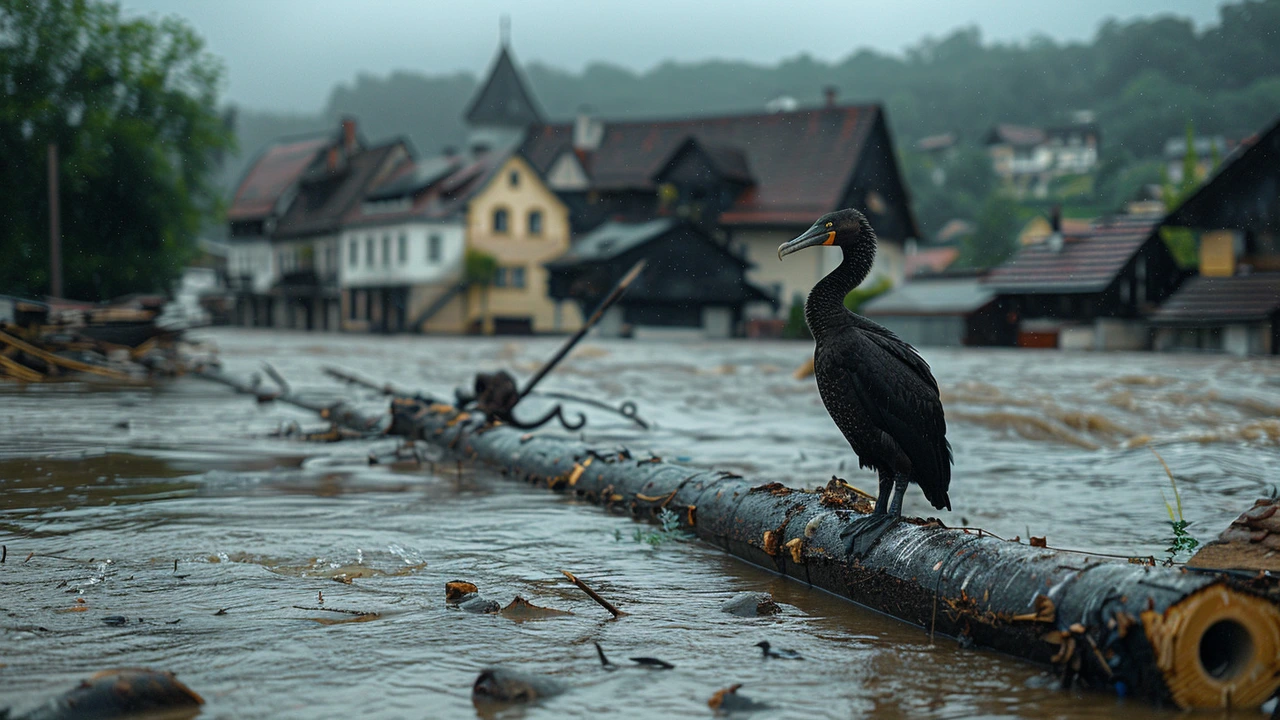Over a harrowing weekend, southern Germany saw its landscapes transform into a watery nightmare, as relentless heavy rain led to widespread flooding. Areas most severely affected include Bavaria and Baden-Wuerttemberg. What started as severe weather warnings soon escalated into a life-threatening situation, claiming the lives of at least four individuals by Monday.
The death toll climbed with the discovery of the bodies of three victims in flooded basements. Authorities first uncovered the body of a 43-year-old woman in the cellar of a house in Schrobenhausen, Bavaria. Then, two more tragic discoveries followed in Schorndorf, near Stuttgart, where a man and a woman were found in a submerged basement. The relentless nature of these downpours has turned ordinarily safe spaces into deadly traps.
Transportation was also hit hard by the deluge, with disruptions causing headaches for commuters and travelers alike. Long-distance rail routes to Munich were suspended, leaving many stranded and unsure of how to proceed. This highlighted just how paralyzing acts of nature can be on critical infrastructure. Railroad tracks submerged underwater, roads washed away, and bridges deemed unsafe formed a grim testament to the fury of the weekend's weather.
In the wake of these events, Chancellor Olaf Scholz along with regional officials scrambled to take stock of the damage firsthand. Visiting the hard-hit town of Reichertshofen, Scholz walked through the streets, now more akin to riverbeds, to meet with local authorities, including Bavaria's Governor Markus Söder. The gravity of the situation was not lost on anyone as they assessed the wreckage and spoke to the affected residents.
Governor Söder was clear in his assessment, describing the severity of the floods as fluctuating. Even as water levels receded in some parts, other areas faced fresh inundations and urgent evacuation orders. The emotional toll on residents and the pressure on emergency services kept mounting, as the region faced this unpredictable natural onslaught.
Chancellor Scholz did not shy away from broader implications either. Speaking with conviction, he tied these floods to broader climate issues, reinforcing the need for decisive action on climate change. Recent events like these, he argued, underline the urgency for more sustainable practices and better preparedness for extreme weather events.
The human stories emerging from southern Germany paint a poignant picture of resilience amid chaos. In every flooded town, tales of heroic rescue efforts, communal solidarity, and personal loss abound. Emergency services, already stretched thin, worked around the clock to pull residents from peril, often risking their own lives. Volunteers from unaffected areas poured in, offering everything from food and blankets to muscle power for the clean-up efforts.
In the city of Munich, usually bustling with tourists and locals, the suspension of rail services left an eerie, quiet atmosphere. Travelers, both international and domestic, were left grappling with cancellations and changes of plans. Local businesses, many already struggling due to the pandemic, faced additional hardship as customer flow dropped precipitously.
Down the roads less traveled, small towns like Schrobenhausen wear a vacant, deserted feel as inhabitants were forced to flee or barricade themselves in safer parts of their homes. Streets riddled with debris, homes marred by muddy waters, and vehicles half-buried in muck captured the episodic violence of nature's fury over a few short days.
The economic toll of this disaster, while secondary to the immediate human cost, is expected to be immense. Damage to property, both public and private, will require structural repairs amounting to tens or even hundreds of millions. Insurance claims are set to soar as residents file for damages to homes, cars, and businesses. Compounded by the logistics challenges in getting supplies and repair crews to the affected areas, the road to recovery is likely to be long and arduous.
Environmental scientists have long warned of the increasing frequency and severity of such weather events. They argue that 'flood-prone' no longer applies to select regions but is becoming a reality for broader territories. Southern Germany's recent experience stands as a sobering reminder of the pervasive impact of climate shifts. Calls are growing louder for infrastructural investments tailored to withstand significant weather anomalies, from elevated roadways to improved drainage systems.
For many living through these unprecedented floods, questions about the future loom large. Conversations at regional and national levels are expected to pivot even more urgently towards climate resilience. Germany, under pressures both internal and external, will need to recalibrate its strategies to handle what increasingly appears to be the new normal.
In the short term, southern Germany’s focus remains squarely on stabilizing the present situation. Efforts are ongoing to rehouse evacuees, clear debris, and restore transportation services. Community shelters are filled with those who, for now, have no home to return to. Local artists, religious groups, and community leaders are organizing events to boost morale and raise funds for those hit hardest.
As the floodwaters eventually recede, they leave behind more than just physical damage. Emotional scars, financial uncertainties, and a renewed awareness of vulnerability to nature will weigh heavily on the collective psyche. Southern Germany, like many other parts of the world facing climate-induced catastrophes, must find within itself the strength to rebuild, adapt, and overcome.




Looks like Mother Nature finally decided to show the world who's boss, and unfortunately, she's not playing nice; the deluge in Bavaria turned streets into rivers, cars into floating wrecks, and morale into a soggy mess. You'd think modern Germany would have some fancy flood barriers, right? Nope-just a lot of water, a handful of panicked residents, and a train schedule that’s now as useful as a chocolate teapot. The whole thing feels like a low‑budget disaster movie, except the budget was our tax dollars and the actors are real people trying to survive. Honestly, the authorities’ response was as swift as a snail on a treadmill-some visits, a few press conferences, and a lot of “we’re doing everything we can” that sounds more like a line from a corporate apology. Meanwhile, commuters are stuck, businesses are hemorrhaging cash, and the only thing rising faster than the water level is the collective sigh of exasperation. If this is a preview of what climate change looks like, maybe it's time to start taking the script seriously.
It is heartbreaking to witness such relentless water swallowing homes, to hear the cries echo through hollowed streets, and to feel the weight of sorrow settling like silt in each heart. The tragedy is not just numbers, it is the story of families torn apart, of lives paused in the cold embrace of mud and flood. In moments like these, the world seems to shrink, and we are left with raw, aching emotions that no simple statistic can capture. The floodwaters carry more than debris; they carry our collective grief, reminding us that we are fragile beings under a fickle sky.
The suffering that follows such a deluge forces us to confront the impermanence of our constructed worlds. When waters surge and breach the boundaries we have drawn, the illusion of control evaporates. This is not merely a meteorological event but a profound reminder of humanity's place within the larger ecological tapestry. The towns that once stood firm now stand humbled, their streets turned to channels of loss. In the quiet after the flood, one can hear the muted whispers of displaced lives yearning for stability. The destruction of infrastructure reveals the fragility of our dependence on engineered systems. Yet amidst the ruin, stories of solidarity emerge, illuminating the capacity for communal resilience. It is in these acts of neighborly aid that hope finds a foothold. The psychological scars left behind may linger longer than the physical wounds, shaping collective memory. As climate patterns shift, the frequency of such catastrophes may increase, demanding a reevaluation of our preparedness. Governments must move beyond rhetoric and invest in adaptive measures that honor the lived realities of affected citizens. Urban planning should incorporate floodplain awareness, integrating green spaces that absorb excess water. Citizens, too, bear responsibility in fostering environmental stewardship, recognizing that individual choices echo on a planetary scale. The narrative of these floods should serve as a catalyst for meaningful transformation rather than a fleeting headline. Ultimately, the true measure of our society will be reflected in how we rebuild not just structures, but the trust and safety of our communities.
Did you know that the 2021 floods in western Europe caused over €300 million in damages, and the situation in southern Germany now looks on track to surpass that? The rail disruptions alone affect thousands of commuters daily, and the economic ripple effect spreads far beyond the immediate area. Emergency services have been stretched to their limits, handling rescues, evacuations, and medical aid around the clock. Climate models have been warning us about increased precipitation events across Central Europe, and these real‑world incidents are the data points that confirm those projections. It's also worth noting that many of the older municipalities have outdated drainage systems that simply can't cope with the volume of water we're seeing. Upgrading those infrastructures is not just a luxury, it's a necessity if we want to mitigate future losses. And while the headlines focus on the tragedy, there are countless volunteers stepping up, distributing supplies, and providing shelter for those displaced. This kind of community response is both heartening and essential in bridging the gap until official aid arrives. In short, the floods are a complex crisis that intertwines environmental, economic, and social challenges, demanding a coordinated response on all fronts.
i totally get wut u said man, those old pipes are jus a mess lol. we really need some fresh infra, cant keep fixin the same thing over and over. also, shoutout to all those volunteers, they r the real heroz out there. keep pushin for better prep, we deserve safer streets. peace!
We’ll rebuild stronger and brighter together.
While the sentiment is commendably hopeful, it would be prudent to underscore the necessity of comprehensive urban planning measures, including but not limited to elevated roadways and robust drainage networks, to ensure that such optimism is grounded in tangible, sustainable action. The current efforts, albeit heartfelt, must be complemented by systematic policy reforms and infrastructural investments, lest we find ourselves repeating history’s unfortunate patterns.